Yves here. America lacks a sense of historical perspective in dealing with long-lived cultures, like that of the Turks. It’s also instructive to look at another not-aggreement-capable player.
By John Helmer, Moscow. Twitter: @bears_with. Originally published at Dances With Bears
Between 11:30 Moscow time on Thursday and 14:00, President Vladimir Putin spent two and a half hours talking with the Turkish President, Recep Tayyip Erdogan, with interpreters present but no one else, and including lunch and toilet breaks. The two presidents then spent three hours and twenty minutes in talks with delegations of their officials before appearing at 17:22 for another sixteen minutes in front of the press. The Turkish clock for the negotiations counted 5 hours 40 minutes; the Kremlin clock, six hours.
The outcome was a document entitled “Additional Protocol to the Memorandum on Stabilization of the Situation in the Idlib De-escalation Area”. This comprises an agreement of three paragraphs amounting to ten lines, and a preamble of four paragraphs repeating what professionals call boilerplate; that’s to say, points with which everyone agrees in principle, and no one in practice.
The difference between the amount of time and effort expended and the outcome isn’t between the mountain and the molehill. It is the result of the Russian side applying the brief script dictated to Putin by the Defence Minister Sergei Shoigu, the Foreign Minister Sergei Lavrov, and the General Staff led by General Valery Gersasimov, and confirmed the day before by the Security Council.
The script is dictated by the principle of the tsarina, Empress Catherine II, during the Turkish-Russian wars of 1768 to 1792. The principle is that nothing the Turks say they agree to or sign can be relied upon; and that everything the Turks can’t achieve with their army will be tested again and again, until and unless they are defeated by the battle of arms and the defence of territory by more force than the Turks can overcome. The corollary of the Catherine principle is that the new agreement between Putin and Erdogan cannot last for long. Because both sides know this, their heads were in the down position, their eyes averted, for longer than has ever been recorded at their summit meetings before.
The Russian state news agency Sputnik has published this minute-by-minute time line of the Kremlin talks. The Kremlin website has published much less.
Erdogan began the negotiations by announcing he didn’t want to be there, but agreed out of solicitude for Putin. “As you know,” he told Putin in the scene pictured below, “we were going to hold this meeting in Turkey but due to your ongoing work on constitutional amendments, we decided to accept your invitation and come here.” It was difficult for either man to look each other in the eye over a lie like that.
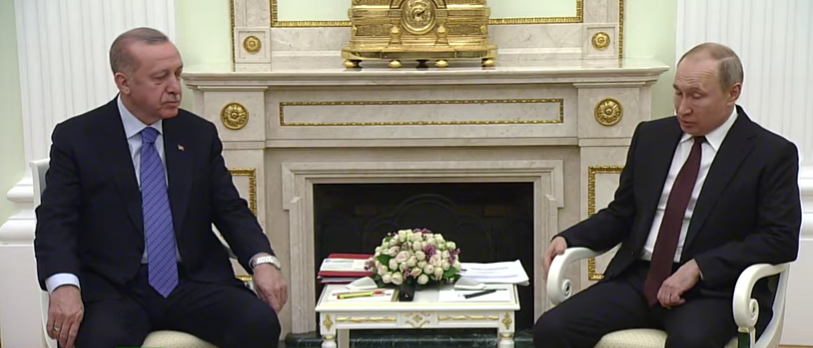
A Syrian commentator did not miss the significance of the location, publishing a photograph of the Turkish delegation – including Defence Minister Hulusi Akar, MIT intelligence chief Hakan Fidan, Foreign Minister Mevlüt Çavuşoğlu — standing beneath a statue of Catherine which he ringed in red for emphasis.
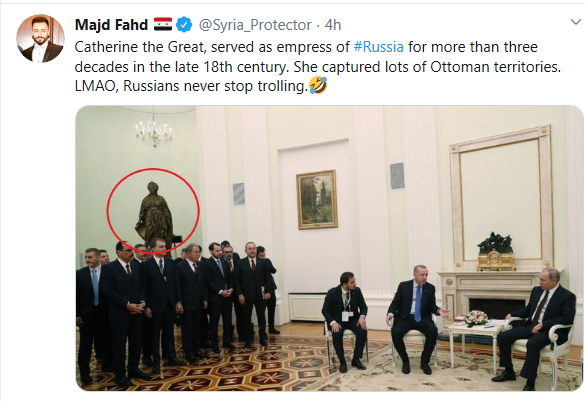
Source: https://twitter.com/Syria_Protector/
The Kremlin has so far been a model of public reticence. The one important photograph published on the Kremlin website of the initial meeting before the talks got under way was of Defence Minister Shoigu shaking hands with Akar and Erdogan. The statue under which they were standing was of Tsar Peter I in military uniform. The day before, Shoigu’s spokesman at the Defence Ministry, Major General Igor Konashenkov, had laid down a marker for the incoming Turks.
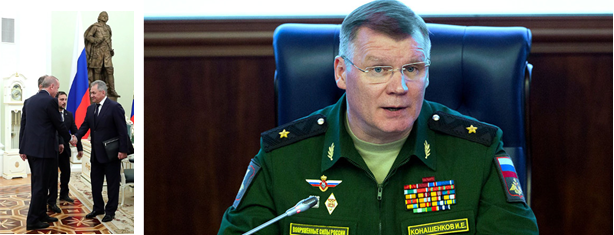
Left image: Erdogan, Akar and Shoigu; right image, Konashenkov.
“No one in the West notices the actions of the Turkish side,” Konashenkov said in a prepared statement, “which, in violation of international law, has deployed a strike force the size of a mechanised division to Syria’s Idlib in order to ‘enforce the Sochi agreements at any cost’”. A mechanised division usually amounts to at least 10,000 troops; Russian estimates to date of the Turkish Army deployment in the Idlib zone have counted no more than five battalion groups of about 5,000 men.
These numbers were important in the talks between Putin and Erdogan because the Turks want to add more; through Konashenkov the Russians have said there were already too many. There is no telling what Putin replied to Erdogan in their one-on-one session. The terms of agreement released after the meeting of delegations announce a ceasefire along the line of contact between Turkish and Syrian forces, as they are this morning, together with a 6-kilometre deep “security corridor” on the northern and southern sides of the M4 Syrian national highway, with joint patrolling of the highway and the corridors by Turkish and Russian units, commencing in ten days’ time.
Two sentences in the preamble which the presidents agreed make fresh Turkish arms and additional troops in the Idlib area unlikely. The first is that the Turks accept “their strong commitment to the sovereignty, independence, unity and territorial integrity of the Syrian Arab Republic”; the second sentence says “there can be no military solution to the Syrian conflict”. Western analysts judge these points mean that “this for now also ends the Turkish threat to attack the Syrian army and to reconquer all areas it had liberated over the last months. Erdogan, who had made many demands, saw none of them fulfilled.”
Russian analysts are more cautious: “Erdogan had to make substantial concessions to get out of the situation,” Boris Rozhin (“Colonel Cassad”) commented. “The new status quo is fixed by the state of the current front line. The Sochi Line is restored. The М5 highway, although not explicitly mentioned, remains in Assad’s control, and Turkey is obliged to accept this. Turkey undertakes to unlock Route M4 by March 15. This is one of the conditions of the Sochi deal, which Turkey had not fulfilled. Now she has an express deadline. In addition, it should provide a buffer security zone north and south of the route of 6 kilometres.”
“On the other hand, Erdogan has not given specific commitments to separate the ‘moderate’ and ‘unsettled’ militants, meaning that the presence of jihadi gangs in Idlib retains a high potential for escalation, both with Turkey’s knowledge and simply at the wishes of individual field commanders.”
Read the full text of the agreement in its English version, published outside Russia for the time being:
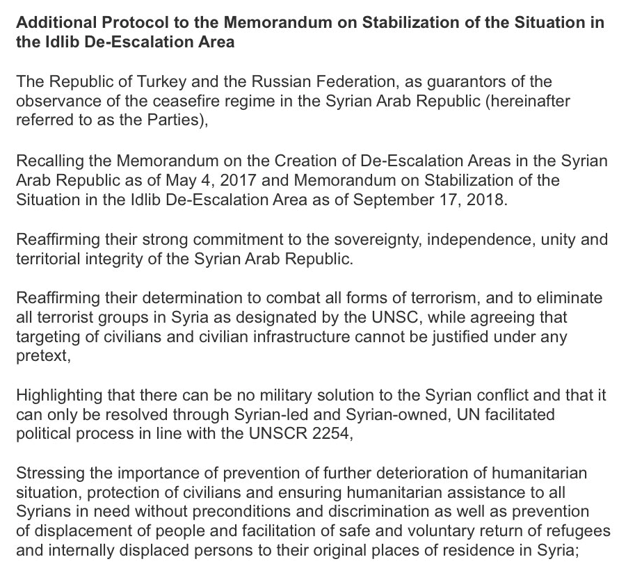
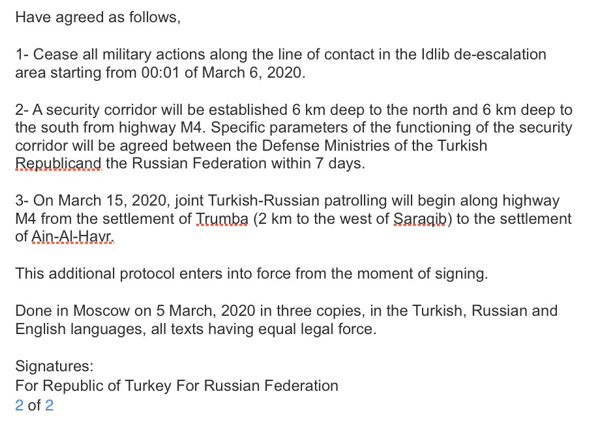
Source: https://www.moonofalabama.org/images10/memo1.jpg and https://www.moonofalabama.org/images10/memo2.jpg
If Erdogan got Putin’s permission to send in more men, tanks and artillery to fill the corridors and reinforce the Turkish side of the contact line, the paper doesn’t say so. As Konashenkov made clear for Shoigu and the Defence Ministry, they do not agree. So far, Lavrov and the Foreign Ministry have remained silent on the talks. The Foreign Ministry website reports Lavrov had a busy day on Thursday, including a meeting with the President of Togo. There is no mention of Lavrov at the Turkish talks.
At the presidents’ press conference both Putin and Erdogan had their heads down to read from carefully prepared scripts before Lavrov and Cavusoglu read out the Russian and Turkish versions of the new protocol.
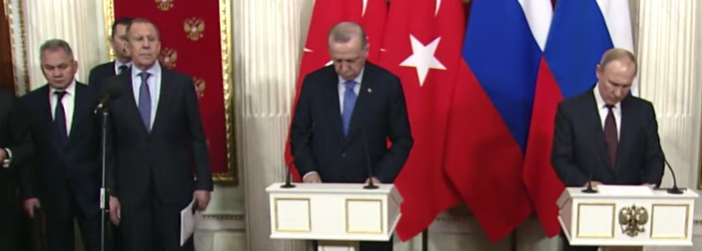
Left to right: Shoigu, Lavrov, Erdogan, and Putin. Source: https://www.youtube.com/
In Erdogan’s script, he said: “Turkey retains the right to respond to any attacks on the part of Syria.” Since this refers to the Syrian Army’s attempts to operate on Syrian territory to recover Syrian sovereignty and territorial integrity, Erdogan’s claim is his excuse to violate the agreement. This was a press conference without questions or answers.


It wasn’t that many years ago that Turkey had a foreign policy of zero problems with neighbouring countries. Those days are long gone now. When Turkey tried to militarily occupy Idlib province to make it part of Turkey and using the al-Qaeda militants as a cover, they found themselves standing alone. Militarily they were facing the Syrians, Russians, Iranians and Hezbollah but they themselves had no allies and were left twisting in the wind. No NATO nation was willing to get into a shooting war with Russia to defend al-Qaeda militants, the EU was outraged when the Turks tried to push over a hundred thousand refugees into the EU itself as blackmail, the US would not because of the purchase by them of Russian S-400 missile systems, Israel took one look at the situation and said nope. They had no one in their corner.
The Turks must have spent billions over the years financing these militant groups and who know how much they have spent on their military operations the past fortnight what between lost military gear and casualties. I use to wonder if it was the Israelis that were helping the militants to send drones against the Russian bases but it looks like I was wrong and it was the Turks all along. But for the Turks, it now gets worse. By killing members of the Iranian forces as well as Hezbollah, both will now seek to put the Turks in the hurt locker down the track in repayment. The Russians will probably upgrade the equipment and training that the Syrians get from them which will make them a much harder nut to crack. I wonder if Putin told Erdogan too that the next time that there was a coup in Turkey, that he may not get a head-up from Russia next time.
I saw a map showing the M4 which both the Turks and Russians will be joint patrolling. With the 6 kilometers on either side, it cuts Idlib province in half and put any militants in the south in a potential fire sack the next time that hostilities breaks out. And I am fairly certain that they will break out but this time the Syrians and Russians will be ready for a direct attack by the Turks. I am trying to think of one thing that the Turks get out of it but a coming up short. Even the Turks are not happy about their soldiers getting killed and a mass fistfight broke out in the Turkish Parliament a coupla days ago about this. And a coupla days ago the Libyans opened up an Embassy in Damascus so I would not be surprised if Turkey started to experience even more problems in their battles there. Time for Erdogan to go.
Actually, Rev Kev, your first sentence is not really correct. Before Erdogan became dictator, err, president Turkey had been meddling with its neighbors. In the early 60’s hard-line Turks welcomed the Jupiter nuclear missiles that John Kennedy offered, knowing it would irritate the Soviets.
In the mid-70’s Turkey invaded Cyprus (with Henry Kissinger’s help) to block Greek-Cypriot unification. They maintain about 25,000 troops there today.
In the 90’s after the Soviet Union collapsed, Turkey helped arms and foreign fighters find their way into Yugoslavia and Chechnya. And the Turkish army mobilized forces attempting to intimidate Armenia away from Russian influence so that Turkey could have direct land access to Azerbaijan.
The Turks have also made numerous incursions into Iraq in the past 30 years to stifle Kurdish independence.
What’s changed is that secular, army-run Turkey has been overthrown by Islamo-corporate-fascist Turkey under Erdogan (and an organization that backs him up). Erdogan’s ideology is to recreate the Ottoman Empire, if not in physical control, than certainly with proxies and puppets installed around the region.
And, yes, Israel is involved in this. With typical Zionist cynicism Netanyahu has parlayed the long friendship with Turkey into direct support. Israeli forces have upgraded much of Turkey’s military hardware, and has helped the Turks to start building their own cutting edge weapons, including drones.
Turkey is now building the Altay tank, using South Korean technology from the K2 tank, the most advanced tank around right now. They’ll have about 1000 deployed over the next ten years. Along with their new Turkish built SP artillery, they will have a decisive edge over all other regional powers before the end of this decade.
Even if Erdogan goes, his successors have a huge power base and will continue the expansionist project.
Turkish aggression is just now heating up.
Actually, not quite right. RTE did start out with a policy of no problems with neighbours (we’re talking the period under RTE, not Turkey in the 1970s or 1980s). Somewhere after 2010 (and Libya), this posture changed.
And after the 2016 attempted coup, RTE decimated the army leadership. So even having lots of weapons won’t help him too much. He has also made too many enemies by now.
Also Turkey silently pushed its border with Bulgaria north by 2 km by illegally altering the Black Sea estuary of the Resovska river over decades, starting 1943 and culminating in almost military action from the Bulgarian side in the late 1970ies. In 1997 Bulgaria signed its agreement to the illegally changed border which also rounds to an even bigger advantage for Turkey with regard to the maritime border…Bulgaria’s prime minister at the time, eager to prove his country’s earnest desire to join NATO, signed away.
This went under the radar outside of the people involved (no one seems to remember) – but this is not quite 0 problems with neighbors. Im sure there are many more from before Erdogan’s time.
If Erdogan stays longer, will that make the AKP less popular inside Turkey? If Erdogan stas longest, will that make the AKP deeply and widely hated all over Turkey?
I see no mention of China here, and little elsewhere in connection with Idlib.
There are said to be thousands of Uighur fighters in Idlib, something that undoubtedly greatly concerns the Chinese authorities, who I assume are taking a very active interest in all this, albeit behind the scenes.
I suspect the ChinaGov would be quietly happy to see every last Uighur jihadist quietly exterminated in Syria. I suspect that the RussiaGov and every Central AsiastanGov also considers any Uighur jihadist which survives to infect Russia or the Asiastans . . . to be a problem best avoided.
The Great Han Lebensraum ChiCom regime in Beijing may discover to its regret that its mass brainwashing camps for Uighurs in Sinjiang may have sensitized the world to innocent Uighur suffering so much that the world may have become DE-sensitized to the genuine problem posed by certain Uighur cannibal liver eating jihadis in Syria. Such a world may well want the Uighur jihadis saved from “genocide” and allowed to go back to China. Would the ChiCom regime be wise enough to link such an outcome to their own “Indian War- Indian Residential School” behavior against the Uighurs in general in Chinese Turkestan?
Europe can stop Erdogan in 1 minute: applying the same sanctions US applies to IRAN. The minute after, the economic Turkish community would prepare the coup d’etat. But Europe is the stupid slave of US and US wants Russia troubled as much as possible. Poor Syrian people.
When Russia applied its version of economic pressure on Turkey after the shootdown of the Su-24, the Turks had little choice but to capitulate and quickly.
Even forgetting that, the only reason that the Ottoman Empire lasted as long as it did was because Europe had to pull its fat out of the fire repeatedly, following nasty beatdowns at Russian hands.
And its not as if the US forced EUrope into slavery in any way. The Lords of EUrope LOVE slaving on the NATO plantation. They hold their own keys to the NATO plantation’s front gate. They can walk out any time they want to. They don’t walk out because they don’t want to.
US did not force… but perhaps, the US did buy the EU elite. The cash flow is hard to give up, particularly as accompanied by economic threats.
Erdogan has been allowed to save face. Unfortunately, I do not believe that he appreciates the opportunity to walk things back gracefully. I hope that I am wrong.
OIFVet:
I was also wondering how much Greece and Bulgaria came up during these discussions. With the historic Russian role (sometimes not benign, but let’s not quibble) of protector of the peoples of the Orthodox church, Putin surely must have hinted that dumping Syrian refugees on the Greeks and, potentially, the Bulgarians, can’t be allowed to continue either.
About all that I can say is that when I was in Istanbul about eight years ago, I witnessed (purely by accident) the last flowering of Turkish democracy that Erdogan would allow. It has been, errrrr, interesting to watch his moral deterioration since then. The Syrian crisis and the Taksim Square events broke out not long after I was there. The man is a terrible strategist–his single tactic is beating everyone into submission.
And it isn’t as if he had the moral high ground to start with, what with all of his attempts to impose Sunni orthodoxy on a population that has always been highly mixed and heterodox (25 million Alevis?).
Scratch a Russian, find a Tartar.
Scratch a Turk, find an Ottoman.
Those old sayings might retain a hint of things to come.
Viewing from afar, I wonder how much Erdogan has been itching to reestablish some notional former glory, whether in Idlib, Libya or points beyond.
Like you, that to me is really the underlying issue – Erdogan wants to go back to the times of the Ottoman Empire, not just from purely controlling a larger land mass but aspects of leadership in the social, cultural, religious fields.
Its the same old “Make America Great Again” crap.
You hit the nail on the head.
So Erdogan is an Ottomaniac . . . . .
Actually, it was the Vikings that founded Russia (that’s what “Rus” means). The boyars/nobility claimed descent from them to the bitter end.
It may be best not to spread (or mindlessly repeat) Russo-phobic propaganda:
“This anecdotal expression originated in France (“Grattez le Russe, et vous verrez un Tartare”) in the 19th century and attributed to Marquis de Cuistine http://en.wikipedia.org/wiki/Marquis_de_Custine who travelled to Russia in 1839. Ever since this saying has been endlessly repeated by either Russophobes or by Russophiles as a proof of either Russian “barbarism” or “otherness”. It’s funny how this manifestation of French arrogance turned into the ultimate wisdom and historical fact (!)”
Erdogan reminds me of Trump in that he can never be counted on to keep his word, constantly talking out both sides of his mouth, trying to play both sides off against each other.
This works for as long as Erdogan has something everyone wants, but in the end, nobody trusts him and everyone wants him gone.
So like the United States in general and President Trump in particular, Turkey under Erdogan is “not agreement capable?”
Something like that, yes.
Both of the leaders understand how the game is played in most parts of the world. The West, unfortunately doesn’t.
In most parts of the world, violence is a negotiating tactic, like bribery, blackmail and economic pressure. Attacking somebody’s forces doesn’t mean you dislike them, it just means that you think it will further your political objectives. You don’t necessarily mind if somebody attacks your forces, or even assassinates one of your people: it’s business, not personal. Thus, traditional allies can hurt each other, and traditional enemies can move from enmity to cooperation and back again. Putin would like to work with Erdogan, but he thinks that the Turkish leader has the wrong attitude and has to be worked over a bit, after which he’ll be more reasonable.
Perhaps, but using violence as a negotiating tactic can start wars, which is why it is not very acceptable to do among some people. There are reasons for diplomacy and jaw-jawing instead of war-war.
From it’s actions, it’s quite clear the West does understand how this game is played. They’ve been playing this game for a long time too. They, like every other country, just like to pretend they don’t (especially to their own populations).
“Speak softly and carry a big stick”
“the brief script dictated to Putin by the Defence Minister Sergei Shoigu […]” I find the choice of words here peculiar. Putin appointed all these people; can they really dictate him anything?
It’s a strong verb, especially as Putin is demonized as the dictator, but I think the author is speaking merely of the delegation of authority. There’s a reason people of Shoigu’s character, and Lavrov’s, etc, have held their appointments so long. They are effective, insightful, unquestionably trustworthy.
Western media hopelessly misunderstand (or, don’t care to understand) the way the Russian govt works. VVP is not a dictator, but works closely with a large group of advisers (he also manages, quietly, the various power struggles; he has supporters and detractors). Since it is the Russian military that is engaged in the Syrian theatre, no one should be surprised that it would have an over-sized say in what happens there.
I know the russian state is complex and unwieldy and that Putin is no dictator and but that sentence sounded like the opposite, i.e., like he is being read the riot act and given his talking points by his own ministers. Even in the West it’s hard to imagine, say, Macron or Merkel meekly submitting to such an exercise.
The photos of Erdogan and Putin with their “heads down” are priceless.
Both look sad, making it look like a sour occasion.
I just hope there will no more refugees or migrants from the region, with the current flu season in effect.
Once it catches on, it could go all directions, north, south, etc.
Since EUrope has zero intention of helping Greece keep them out, I hope the GreeceGov can quietly work together with all the other Balkan StateGovs to redball-greenlight the swift passage of all those refugees through the Balkans into the Luxury Lifestyle heart of EUrope . . . . if Greece is unable to hold back the tide.
Dating at least back to 2010, as I learned in my first runthrough of Greece, it’s EU policy that illegal immigrants, once apprehended, be sent back to their point of entry – which is overwhelmingly Greece, and why Greece is overwhemed. Local Athenians told me only one in ten people in the center of Athens were Greek. Sheer chaos.
If Erdogan resigned today, Turkey would still have the same Syria-related problems:
1. 3.6 million refugees, many of whom will never be willing to return to a Ba’athist Syria.
2. A well-armed Kurdish ministate on their frontier.
Erdogan’s original foreign policy was pacific, and mostly successful: “zero problems with neighbours.” But in 2012 he made a fateful gamble on a quick rebel victory in Syria. Bear in mind that at the time he had been promised a Libya-style Western intervention. The USA and KSA were funneling in arms and money, and pressuring Turkey to provide the geographic link. Remember that if it hadn’t been for a Tory backbench revolt in the UK in 2013, there probably would have been a typical coalition.
It’s ironic that people accuse Erdogan of being a bad ally. He got betrayed earlier and much worse by Obama. Don’t forget how slow the NATO countries were to denounce the military coup plotters who tried to assassinate Erdogan, nor that the USA continues to offer asylum to some of those involved.
Another thing is that as a moderate Islamist politician who had long been persecuted by a secular authoritarian government, Erdogan no doubt has considerable personal sympathy for the MB types involved in the Syrian revolts.
I mention these things not to justify Erdogan’s rotten decision to meddle in Syria’s internal affairs, but to remind NC readers of the context. With the context in mind, it is apparent that Turkey had no prior scheme to annex or occupy a province of Syria. Rather, the Turkish invasion aims to protect a non-Ba’athist Syrian rump state to which Turkey can in future dump rebel refugees–this is a Plan C or D we’re talking about here.
Allegations of “Ottomanism” are just a waste of time. Erdogan has spoken favourably of Turkey’s imperial past, in a manner little different from how Putin has spoken of Russia’s Soviet or Romanov past. Neither of these leaders is trying to rebuild a defunct empire. What they’re trying to do is reintegrate the history and cultural memory of their nations, after long periods during which such narratives were limited by partisan agendas.
I am afraid that Erdogan’s aims have changed here and now he does want pieces of Syria to become part of Turkey. He said publicly that Turkey was the ‘host’ in Idlib but in recent speeches has mentioned how places like Mosul and Idlib and other places are strong in Turkish hearts i.e. he wants them.
Years ago those places in Syria that Turkey got a presence in started issuing Turkish ID cards to the people there and issue Turkish textbooks to the schools and not Syrian school books. Even Iraq has a Turkish base in their territory that they are trying to get rid off. Whether it is a desire to restore the Ottoman empire or just because he is an opportunist, Erdogan’s Turkey is now definitely an expansionary power.
Agree that Erdogan was misled by the West that Syria was, for humanitarian reasons, to be turned into another Libya, and he was somewhat left holding the bag – to the benefit of humanity.
Disagree completely that he does not have an expansionist mindset or that he could be compared to Putin and Russia. There is no denial in Putin’s administration about the dire ills of the Soviet Union. He hammers on this point repeatedly, whether in his speech at the UN several years ago, dropping Obama and Power’s jaws in saying, “The Soviet Union tried to export ideologies. We have learned from our mistakes; when will you learn from yours?” to his most recent 4-hr q&a where he recounted his time in the KGB with an anecdote about an older officer who caused most of the rest of the officers to more or less hide under their desks everytime he entered the building, as this man was instrumental to the purges and the gulags under Stalin. Putin stressed this must never be forgotten, and that it is not so long ago.
Erdogan? Continues not only to deny the decades-long, systematic destruction of the Armenians, Greeks, Assyrians, but is actively involved in bankrolling Azerbaijan’s continuing threat in Artsakh. He knows he cannot outright destroy Armenia, but I have little doubt he would if he could.
Was not HRC Secretary of State at the time?
The comment is waayyy misleading. It restates certain assumptions as fact, and misrepresents certain facts. Few know how many refuges there are, and whether they’d be willing to return to Syria.
The initial money flow to jihadists was from Qatar (as confirmed by FT, in May 2012), not KSA. Qatar and Turkey share support for Muslim Brotherhood.
“It’s ironic that people accuse Erdogan of being a bad ally.” The irony is well-deserved. Just reading the headline of this article, gives one a bit of historical context.
And, wow, talk about whitewashing: ” … as a moderate Islamist politician who had long been persecuted by a secular authoritarian government, Erdogan no doubt has considerable personal sympathy for the MB types involved in the Syrian revolts.” Shoul we take out our handkerchiefs for RTE? Poor, moderate islamist (his party has roots in MB, in case you did not know)! An armed struggle by jihadists against the secular Syrian state has been going on for decades. They mostly just want to take over – but we’ve seen what a Syria under their control would look like (not the least of which would be disposing of all Christians).
“…it is apparent that Turkey had no prior scheme to annex or occupy a province of Syria.” How is this apparent? At the start, RTE said that he’d not rest, until he could pray at the Ummayad mosque in Damascus. So much for not annexing anything.
RTE is a neo-ottoman (via Islamisation) – check out his many statements on the subject and/or do read some (actualy) knowledgeable Turkish analysts.
Erdogan is not lying about Turkey’s refugee problem:
https://www.unhcr.org/tr/wp-content/uploads/sites/14/2019/11/UNHCR-Turkey-One-Pager-Fact-Sheet-Oct2019.pdf
UNHCR:
“Turkey is home to the world’s largest refugee population, with over 3.6 million Syrian refugees and close to 400,000 refugees and asylum seekers of other nationalities.”
Mind you, one of the untold stories of the Syrian War is the number of people who fled towards government-controlled parts of Syria. Those people are IDP’s and figures are hard to find. WFP says there are 6.2 million IDP’s in Syria. Not all of those are in government-controlled Syria, but taking one look at a map indicating the location of IDP camps, one can deduce that the Syrian government are themselves handling an enormous relief effort, as big as Turkey’s:
https://docs.wfp.org/api/documents/04cc997f7f4e41f9bec508e24bb6d965/download/?_ga=2.195688108.1699046756.1583719921-443554327.1583719921
My point is that the world’s main job in Syria is to bring the fighting to an end, even if a political solution is postponed indefinitely. Rhetoric about butchers and sultans is a waste of time. Suggestions that Turkey could annex any significant portion of Syria simply do not make sense, for Turkey has neither enough troops nor enough money to do so. Turkey has earned enough blame in this war that there is no need for hyperbole.